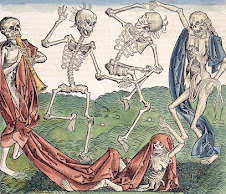Subscribe to:
Post Comments (Atom)
skip to main |
skip to sidebar
This is blog for students of History 102g - Medieval Civilization
Discussion Section Syllabus
History 102g, Medieval Civilization Discussion Section Syllabus
Fridays 9am, 12pm
TAs: Stacey Lutkoski & Ericka Swensson
Email: staceybl@usc.edu, emswensson@yahoo.com
Office: Shrine Offices
Welcome to the discussion section for History 102g. Discussion sections will examine and elaborate on the material presented through the lectures and readings. These classes will help us work through difficult concepts and problematize historical issues. As stated in the course syllabus, the discussion sections are worth 20% of your total course grade. Half of your discussion section grade will be determined by performance in the section itself. In order to receive full credit you need to be present at every class with the readings in hand, be an active participant, and demonstrate a familiarity with the sources.
Cell phone calls, tardiness, inappropriate use of laptops, and other disruptive behavior will not be tolerated and will adversely affect your grade.
Attendance is mandatory. Consult the course syllabus for more information on the attendance policy and penalties.
The second half of your discussion section grade will depend upon your performance in our class blog. Please email Ericka if you have not yet been added to the blog. This is your responsibility, and we will not be held responsible for your negligence. Each week we will post an assignment by Monday evening. You must post a thoughtful paragraph response on the blog by Thursday at 8pm. Late postings will not be accepted. We encourage you to use the blog not only as a place to express your ideas but also as a discussion forum by responding to your classmates’ postings. Your post should neither be a “fact” oriented question/ comment nor a question concerning the content of the works themselves, i.e.: a question that requires outside sources to answer. Rather, your response statement should deal exclusively with the contents of the texts themselves. Also, make sure that you cite the page(s) used for your question or comment.
This syllabus is subject to change. We will communicate with you outside of class primarily through email, and it is your responsibility to check your account regularly for pertinent information. If you have any questions or concerns, feel free to contact either one of us.
Any student requiring academic accommodations based on a disability is required to register with Disability Services and Programs (DSP) each semester. A letter of verification for approved accommodations can be obtained by DSP. Please be sure the letter is delivered to us as early in the semester as possible. DSP is located in STU 301 and is open 8:30am-5:00pm Monday through Friday. The phone number for DSP is (213) 740-0776.
2 comments:
The obvious difference between The Knight of the Cart and the Lais of Marie de France is that The Knight of the Cart is a much longer narrative than the quick short Lais. However, I feel that because Marie de France's Lais are short, there is a lot of information given at one time than with Knight of Cart. For example, when we discussed on Wednesday how the two texts describe the people in the stories, Marie de France's Lais gives a lot of detail to looks and desirable traits and family ties, while Knight of Cart is not as focused on appearance details as Lais.
Both of these text deal with love and for the most part they deal with the love of adulterers. I feel that in Knight of Cart the love between Lancelot and Gwenivere is handled as more of a narrative account of their true love quest to be together. With the Lais, Marie de France writes almost like an Aesop's Fables of love. Each little story centers around the love conflicts between two people, one of which usually is married to someone else. I feel that at the end of each story, there is a moral to it, giving insight to what Marie de France probably thought about love.
I personally liked the Lais better than Knight of Cart because its fast paced storyline makes it easier to read and the messages read clearer. The only thing that I was confused with was that in several of the stories, the adulterers usually don't end well but with the first story the characters end up together in a 'true love prevails all' kind of situation. Why the change in perspective from the author?
“The Knight of the Cart” and Marie de France “Lais” are similar in the way that they both concern themselves with love and adultery. In both texts, we as readers do not see adultery presented in question of its being right or wrong. Rather, we see passion and Love in the heroes and heroines' actions. However, “The Knight of the Cart” throws in a third element with Logic. While reasoning is incorporated in “The Knight of the Cart”, the protagonists are driven solely by Love (often to an unreasonable degree). Adultery becomes a justified action in both accounts, if done for Love (especially if the damsel is locked away against her will). Personally I liked Marie de France better, although I found the descriptions very epic and unrealistic, in a way it was pleasantly distracting.
Post a Comment